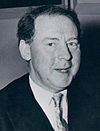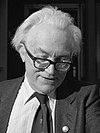Leader of the Labour Party (UK)
| Leader of the Labour Party | |
|---|---|
since 12 September 2015 | |
| Inaugural holder | Keir Hardie |
| Formation | 17 January 1906 |
| Deputy | Tom Watson MP |
The Leader of the Labour Party is the most senior politician within the Labour Party in the United Kingdom. Since 12 September 2015, the office has been held by Jeremy Corbyn.
Harriet Harman is the Deputy Leader of the Labour Party and also Acting Leader since the resignation of Miliband on 8 May 2015 following the 2015 general election. On 12 September 2015, she was replaced by Jeremy Corbyn, whom won the Labour leadership election.
History
The post of Leader of the Labour Party was officially created in 1922. Before this time, between when Labour MPs were first elected in 1906 and the election in 1922, when substantial gains were made, the post was known as Chairman of the Parliamentary Labour Party.[1]
In 1921, John Robert Clynes became the first Leader of the Labour Party to be born in England; prior to this, all Leaders had been born in Scotland. In 1924, Ramsay MacDonald became the first ever Labour Prime Minister, leading a minority administration. Clement Attlee would become the first Leader to lead a majority government in 1945. The first to be born in Wales was Neil Kinnock, who was elected in 1983. The most electorally successful Labour Leaders to date are Tony Blair, who won three in 1997, 2001 (both landslide victories), and 2005, and Harold Wilson, who won four general elections out of five contested, in 1964, 1966, February 1974, and October 1974.
Selection
Unlike other British political party leaders, the Labour Leader does not have the power to dismiss or appoint their Deputy. Both the Leader and Deputy Leader are elected by an Alternative Vote system. From 1980 to 2014 an electoral college was used, with a third of the votes allocated to the Party's MPs and MEPs, a third to individual members of the Labour Party, and a third to individual members of all affiliated organisations, including socialist societies and trade unions. The 2015 leadership election will use a "one member, one vote" system, in which the votes of party members and members of affiliated organisations are counted equally. MPs and MEPs votes are not counted separately, although a candidate needs to receive the support of 15% of Labour MPs in order to appear on the ballot.
Role
When the Labour Party is in Opposition, as it currently is, the Leader of the Labour Party usually acts as the Leader of the Opposition, and chairs the Shadow Cabinet. Concordantly, when the Party is in Government, the Leader would usually become the Prime Minister of the United Kingdom, First Lord of the Treasury and Minister for the Civil Service, as well as appointing the Cabinet.
Leaders of the Labour Party (1906–present)
A list of Leaders (including Acting Leaders) since 1906.[2]
| Leader (Birth–Death) |
Portrait | Constituency | Took Office | Left Office | Prime Minister (term) | |
|---|---|---|---|---|---|---|
| Keir Hardie (1856–1915) |

|
Merthyr Tydfil | 17 February 1906 | 22 January 1908 | height=20 style="background-color: Template:Liberal Party (UK)/meta/color; border-bottom:solid 0 gray" | | C.-Bannerman 1905–08 |
| Arthur Henderson (1863–1935) (1st time) |

|
Barnard Castle | 22 January 1908 | 14 February 1910 | height=20 style="background-color: Template:Liberal Party (UK)/meta/color; border-bottom:solid 0 gray" | | |
| rowspan="4" style="background-color: Template:Liberal Party (UK)/meta/color" | | Asquith 1908–16 | |||||
| George Nicoll Barnes (1859–1940) |

|
Glasgow Blackfriars and Hutchesontown | 14 February 1910 | 6 February 1911 | ||
| Ramsay MacDonald (1866–1937) (1st time) |

|
Leicester | 6 February 1911 | 5 August 1914 | ||
| Arthur Henderson (1863–1935) (2nd time) |

|
Barnard Castle | 5 August 1914 | 24 October 1917 | ||
| rowspan="3" style="background-color: Template:Liberal Party (UK)/meta/color" | | Lloyd George 1916–22 | |||||
| William Adamson (1863–1936) |

|
West Fife | 24 October 1917 | 14 February 1921 | ||
| J. R. Clynes (1869–1949) |
File:Jrclynes.jpg | Manchester Platting | 14 February 1921 | 21 November 1922 | ||
| height=20 style="background-color: Template:Conservative Party (UK)/meta/color; border-bottom:solid 0 gray"| | Law 1922–23 | |||||
| Ramsay MacDonald (1866–1937) (2nd time) |

|
Aberavon | 21 November 1922 | 1 September 1931 | height=20 style="background-color: Template:Conservative Party (UK)/meta/color; border-top:solid 0 gray"| | |
| style="background-color: Template:Conservative Party (UK)/meta/color" | | Baldwin 1923–24 | |||||
| height=20 style="background-color: Template:Labour Party (UK)/meta/color" | | himself 1924 | |||||
| style="background-color: Template:Conservative Party (UK)/meta/color" | | Baldwin 1924–29 | |||||
| style="background-color: Template:Labour Party (UK)/meta/color" | | himself 1929–31 | |||||
| Arthur Henderson (1863–1935) (3rd time) |

|
Burnley | 1 September 1931 | 25 October 1932 | rowspan="2" style="background-color: Template:National Labour Party (UK)/meta/color" | | MacDonald 1931–35 |
| George Lansbury (1859–1940) |

|
Bow and Bromley | 25 October 1932 | 8 October 1935 | ||
| Clement Attlee (1883–1967) |

|
Limehouse | 8 October 1935 | 14 December 1955 | style="background-color: Template:Conservative Party (UK)/meta/color" | | Baldwin 1935–37 |
| style="background-color: Template:Conservative Party (UK)/meta/color" | | Chamberlain 1937–40 | |||||
| style="background-color: Template:Conservative Party (UK)/meta/color" | | Churchill 1940–45 | |||||
| style="background-color: Template:Labour Party (UK)/meta/color" | | himself 1945–51 | |||||
| style="background-color: Template:Conservative Party (UK)/meta/color" | | Churchill 1951–55 | |||||
| height=20 style="background-color: Template:Conservative Party (UK)/meta/color; border-bottom:solid 0 gray" | | Eden 1955–57 | |||||
| Hugh Gaitskell (1906–1963) |

|
Leeds South | 14 December 1955 | 18 January 1963 (Died in office.) |
height=20 style="background-color: Template:Conservative Party (UK)/meta/color; border-top:solid 0 gray" | | |
| height=20 style="background-color: Template:Conservative Party (UK)/meta/color; border-bottom:solid 0 gray" | | Macmillan 1957–63 | |||||
| George Brown× (1914–1985) |

|
Belper | 18 January 1963 | 14 February 1963 | height=20 style="background-color: Template:Conservative Party (UK)/meta/color; border-bottom:solid 0 gray; border-top:solid 0 gray" | | |
| Harold Wilson (1916–1995) |
File:Harold Wilson Number 10 official.jpg | Huyton | 14 February 1963 | 5 April 1976 | height=20 style="background-color: Template:Conservative Party (UK)/meta/color; border-top:solid 0 gray" | | |
| style="background-color: Template:Conservative Party (UK)/meta/color" | | Douglas-Home 1963–64 | |||||
| style="background-color: Template:Labour Party (UK)/meta/color" | | himself 1964–70 | |||||
| style="background-color: Template:Conservative Party (UK)/meta/color" | | Heath 1970–74 | |||||
| style="background-color: Template:Labour Party (UK)/meta/color" | | himself 1974–76 | |||||
| James Callaghan (1912–2005) |

|
Cardiff South East | 5 April 1976 | 10 November 1980 | style="background-color: Template:Labour Party (UK)/meta/color" | | himself 1976–79 |
| height=20 style="background-color: Template:Conservative Party (UK)/meta/color; border-bottom:solid 0 gray" | | Thatcher 1979–90 | |||||
| Michael Foot (1913–2010) |

|
Ebbw Vale | 10 November 1980 | 2 October 1983 | style="background-color: Template:Conservative Party (UK)/meta/color; border-bottom:solid 0 gray; border-top:solid 0 gray" | | |
| Neil Kinnock (1942–) |

|
Islwyn | 2 October 1983 | 18 July 1992 | style="background-color: Template:Conservative Party (UK)/meta/color; border-top:solid 0 gray" | | |
| height=20 style="background-color: Template:Conservative Party (UK)/meta/color; border-bottom:solid 0 gray" | | Major 1990–97 | |||||
| John Smith (1938–1994) |
Monklands East | 18 July 1992 | 12 May 1994 (Died in office.) |
style="background-color: Template:Conservative Party (UK)/meta/color; border-bottom:solid 0 gray; border-top:solid 0 gray" | | ||
| Margaret Beckett× (1943–) |

|
Derby South | 12 May 1994 | 21 July 1994 | style="background-color: Template:Conservative Party (UK)/meta/color; border-bottom:solid 0 gray; border-top:solid 0 gray" | | |
| Tony Blair (1953–) |

|
Sedgefield | 21 July 1994 | 24 June 2007 | height=20 style="background-color: Template:Conservative Party (UK)/meta/color; border-top:solid 0 gray" | | |
| style="background-color: Template:Labour Party (UK)/meta/color; border-bottom:solid 0 gray" | | himself 1997–2007 | |||||
| Gordon Brown (1951–) |

|
Kirkcaldy and Cowdenbeath | 24 June 2007 | 11 May 2010 | style="background-color: Template:Labour Party (UK)/meta/color" | | himself |
| Harriet Harman× (1950–) (1st time) |

|
Camberwell and Peckham | 11 May 2010 | 25 September 2010 | style="background-color: Template:Conservative Party (UK)/meta/color; border-bottom:solid 0 gray" | | Cameron 2010–present |
| Ed Miliband (1969–) |

|
Doncaster North | 25 September 2010 | 8 May 2015 | style="background-color: Template:Conservative Party (UK)/meta/color; border-top:solid 0 gray" | | |
| Harriet Harman× (1950–) (2nd time) |

|
Camberwell and Peckham | 8 May 2015 | 12 September 2015 | style="background-color: Template:Conservative Party (UK)/meta/color; border-bottom:solid 0 gray" | | |
| Jeremy Corbyn (1949–) |

|
Islington North | 12 September 2015 | Incumbent | style="background-color: Template:Conservative Party (UK)/meta/color; border-top:solid 0 gray" | | |
Note: ×Deputy Leaders who assumed the role of party leader temporarily because of the death or resignation of the incumbent, serving until the election of a new leader.[3] George Brown and Margaret Beckett acted as leader following deaths of Hugh Gaitskell and John Smith, respectively. Harriet Harman acted as leader when Gordon Brown and Ed Miliband resigned.
Retirement
It is not uncommon for a retired Leader of the Labour Party to be granted a peerage upon their retirement, particularly if they served as Prime Minister; examples of this include Clement Attlee and Harold Wilson. However, Neil Kinnock was also elevated to the House of Lords, despite never being Prime Minister, and Michael Foot declined a similar offer.
There are currently four living former Leaders of the Labour Party (with the period they were in office):
- The Rt Hon The Lord Kinnock (1983–1992)
- The Rt Hon Tony Blair (1994–2007)
- The Rt Hon Gordon Brown (2007–2010)
- The Rt Hon Ed Miliband MP (2010–2015)
- The Rt Hon Harriet Harman MP (2010, 2015)
See also
References
- ^ Thorpe, Andrew. (2001) A History Of The British Labour Party, Palgrave, ISBN 0-333-92908-X
- ^ "Leaders of the Labour Party". election.demon.co.uk. United Kingdom Election Results. Retrieved 30 June 2015.
- ^ Labour Party Rule Book 2008 (PDF), The Labour Party, retrieved 12 May 2010,
When the party is in opposition and the party leader, for whatever reason, becomes permanently unavailable, the deputy leader shall automatically become party leader on a pro-tem basis.

